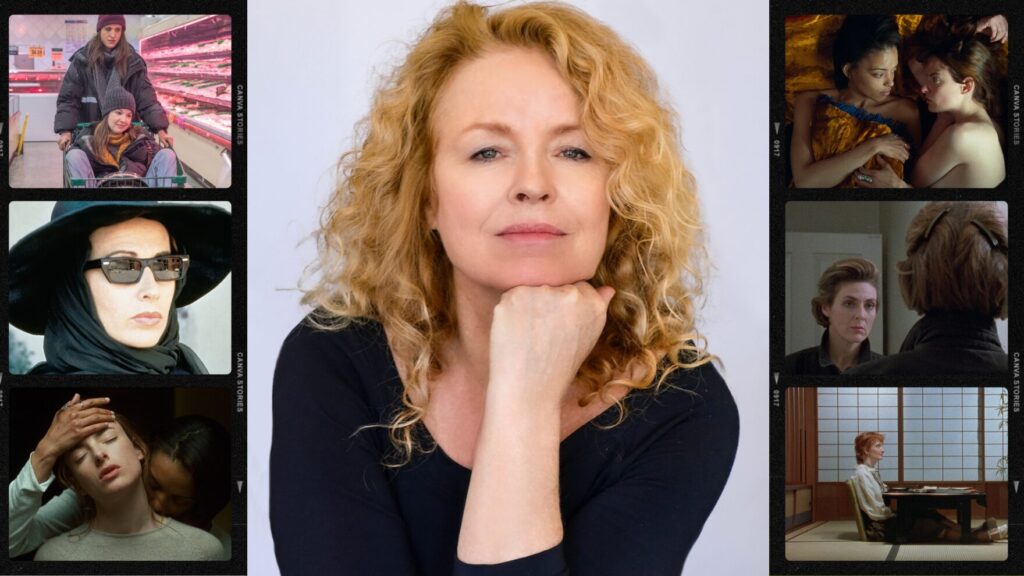Patricia Rozema, trailblazing lesbian director, gets a fabulous film retrospective
Queer cinephiles with a belief in gay and lesbian cinema as its own genre may already have the films of Patricia Rozema on their radars or in their collections. Now, the trailblazing multi-genre auteur is having a coast-to-coast film retrospective on the big screen.
If you are an LGBTQ+ film lover of a certain age you will likely remember when two ‘lesbian’ movies, I’ve Heard the Mermaids Singing (1987) and When Night Is Falling (1995), forced a space open in the world of independent and arthouse cinema—and dazzled the festival circuits from Cannes to TIFF. Their writer-director, Patricia Rozema, was a Canadian lesbian filmmaker with a non-industry background, and in spite of—or perhaps because of—her newness, she brought things to the medium we hadn’t yet seen. These are Rozema’s most evidently and radically queer films, but she is known for at least seven remarkable features, four of which are restored and presented by Kino Lorber in a retrospective.
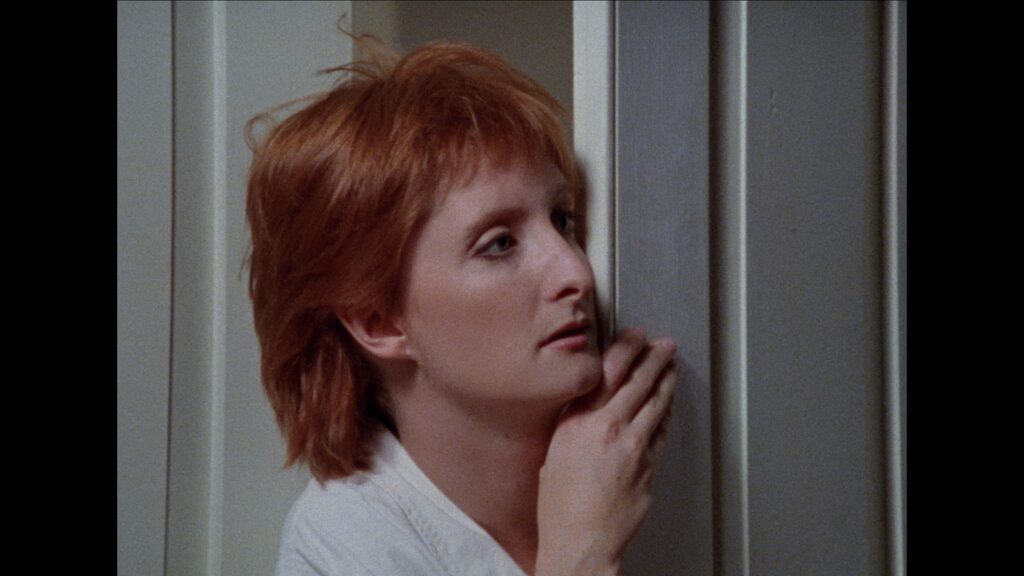
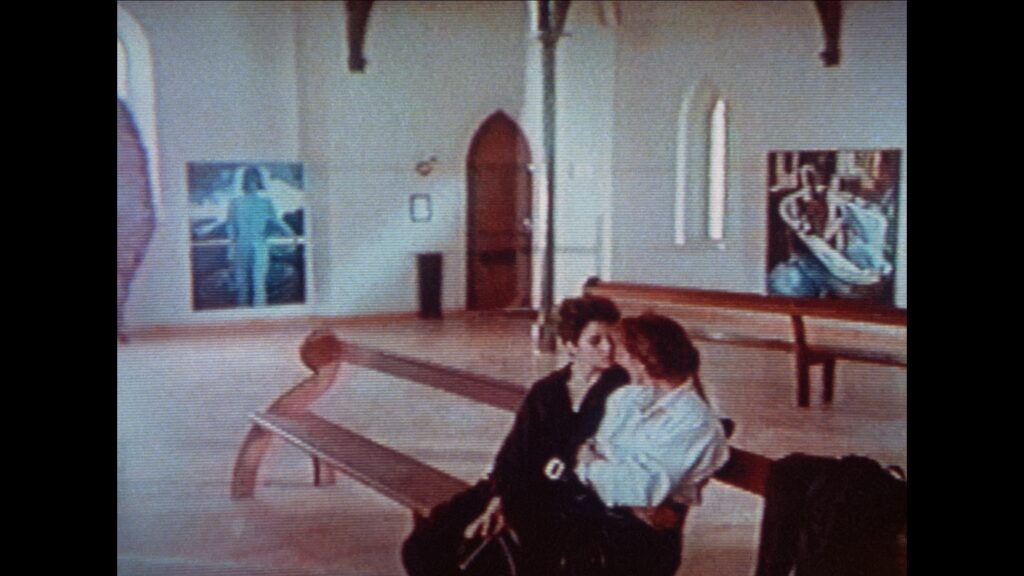
I’ve Heard the Mermaids Singing
Rozema’s work defies categorization and draws eclectically on multiple genres—from fairytale to thriller, comedy to drama. But always with a noteworthy repurposing of form. Not yet 30 years old when she wrote and directed I’ve Heard the Mermaids Singing, Rozema came out of almost nowhere and was an outlier of the film industry. A reinvented Dutch Calvinist from small-town Canada with a degree in philosophy she became an instant success, receiving a 10-minute standing ovation at Festival de Cannes. How did she get there? Pluck, luck, plenty of talent, and a solid work ethic, but mostly because of the stories she wanted to tell and the way she set about bringing them into reality.
“I was just making something that I needed to see that I hadn’t seen,” Rozema tells me in an interview. “I couldn’t imagine that there would be a response and I didn’t actually care because I just knew it would be beautiful to make it. And I made it for ten cents and I thought a few of my friends would watch it. But to have that kind of reach and impact was so satisfying and made me feel so less alone in the world.”
Living in Toronto, quite aware that she wasn’t part of mainstream film culture, Rozema nevertheless wrote Mermaids Singing to address her own feelings of artistry, queerness, and acceptance. She had been inspired by the 1985 British romantic comedy My Beautiful Laundrette where the characters are eventually revealed to be gay and it’s no big deal. “That’s the way to do it,” says Rozema, recalling her excitement around that film. “Get to know them as individuals, as humans in a context, with lives, because that’s all we want—we want to just be individuals, we don’t want to be relegated to a category where people can have an opinion before they’ve even met you as a human.”
If you haven’t seen I’ve Heard the Mermaids Singing you must. The film benefits from its restoration, however, it’s as fresh and as funny as it ever was. Polly (Sheila McCarthy), an ‘ugly duckling’ temp secretary (a person Friday) who falls under the spell of her glamorous bisexual art curator boss, is someone we had not seen in 1987 and may not have seen since. Polly is like so many queer and non-binary people—she is struggling to arrive and be accepted—and in 1987 a happy ending for her was not necessarily guaranteed. The film’s fish-out-of-water premise is never cliched, not even almost 40 years after it was filmed. It tells a tale that never gets old: of being true to one’s self and transcending the pretensions and falsehoods of others.
Rather than be aspirational or pragmatic, Rozema decided to be “self-soothing” with Mermaids Singing, to address her own insecurities and the fear that she, as an aspiring artist, “didn’t rate.” What might that look like as a character, as a narrative? Her mission in that moment was to “make something that pleases you and even if the world doesn’t get it, it doesn’t matter.” The film contains themes and tropes that would also define Rozema’s other landmark movies: transcendence, flights of fancy, offbeat humor, and magic. The iconic scene in Mermaids Singing where Polly’s stylish boss invites her to a formal Japanese restaurant and of course Polly orders the wrong thing—a glass of milk and a gigantic raw octopus leg—is an example of this humor. And the final scene, which I won’t spoil for you, is an example of magic. Compare that ending with the ending of Rozema’s Into the Forest (2015) and you’ll begin to see a thematic pattern that spans a quarter of a century.

As successful as Mermaids Singing was, Rozema’s second feature, White Room (1990), was deemed perplexing—to the extent that it didn’t get a U.S. theatrical release. And yet here is a cinematic gem. Of her cinematic body of work, this is the film, Rozema tells me, fascinates college-age viewers. Rozema’s intention in making the film was to react against the acclaim of Mermaids Singing and to interrogate the very idea of success, celebrity, and fairytale archetypes. “What if I were to slip into a male character?” she muses. “Can I do that?” And so she came up with a protagonist who was an outlier but who was a kind of prince, besotted with two women, the witness to the murder of one and a terrible secret kept by the other. “What confusing illumination would that cause?” asked Rozema. White Room defies genre and yet it evokes a theme that would be found in most of her films: the duality of women, and the split self. The film also experiments with the idea of the male gaze, and the inscrutability of its female characters who seem almost hostile: A Garboesque Kate Nelligen, Margot Kidder as a mere video chimera, and Shelia McCarthy in a role that is the complete opposite of I’ve Heard the Mermaids Singing—confident, hostile, mouthy.
“Could I be the guy?” mused Rozema, like a male version of Polly, striving for some artistic transcendence they just can’t reach. And could she take a journey through genres—from thriller to comedy to pastoral romance to fairytale—in a way that was deliberately destabilizing. Rozema wanted to have “many colors on her palette,” but she also wanted to artistically benefit from the marginality of women. “Because there have been fewer female directors and because there are fewer fixed expectations of what they’re going to come up with, female directors’ work has a greater range to it,” she says. “I like to think that my work is very different, one to the next.”
Rozema’s films are always adventurous, experimental, exciting, amusing, arresting, and—as Roger Ebert noted when reviewing her 1999 feature Mansfield Park—”uncommonly intelligent.” At times her films predict trends to come: the fluidity of “person Friday” Polly; the obsession with celebrity, digital media and mimicry in White Room, and much more. Being attuned to the world is part of queer identity, says Rozema, and it’s also earned her a place in feminist film canons. But her early exposure to strict religion where she heard “fantastic tales” from the Bible, and familiarity with the abject self, gave her a modesty and a work ethic that was a secret weapon.
“I’ve got a Calvinist work ethic, and that’s a secret to achieving things, more than talent, more than having something to say.” She’s also maintained a nostalgia for religion’s more valuable aspects such as “collective communing about things bigger than ourselves, working from the highest part of yourself, a sense of the big moments. Sobriety. Forgiveness. We’re missing these things as a species right now,” she says.
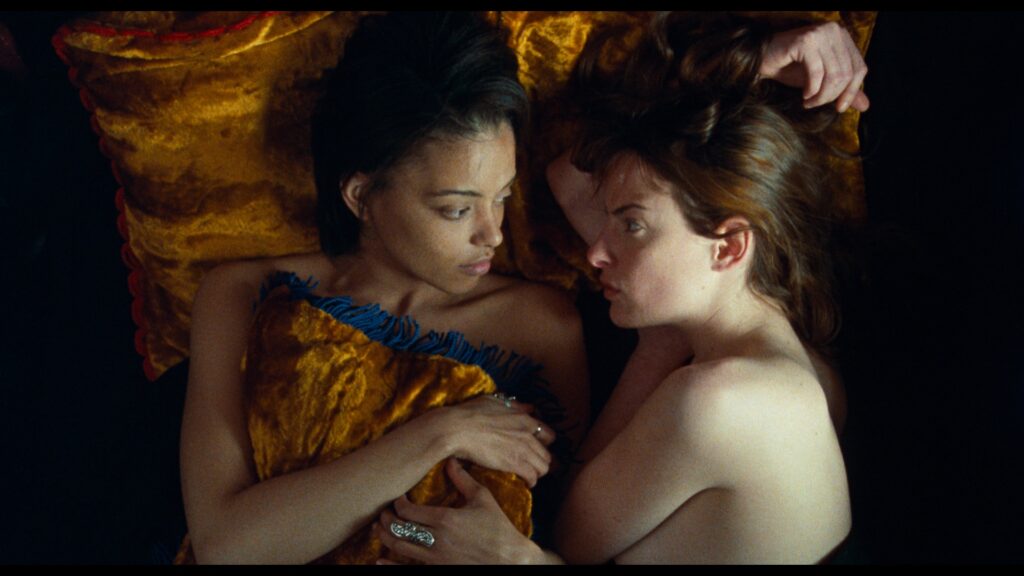
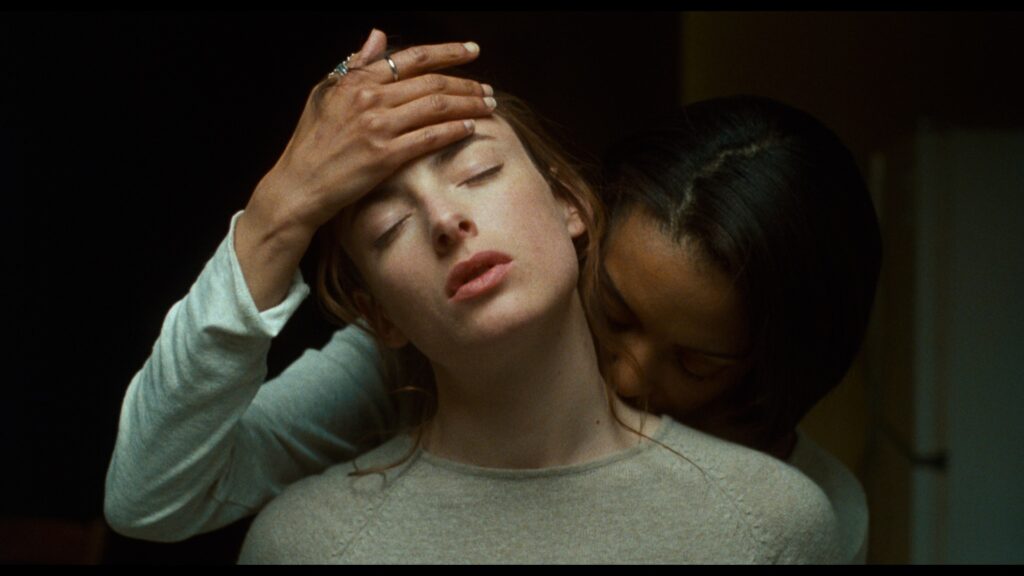
When Night Is Falling
Religion is a theme she deals with directly in When Night Is Falling (1995) which is “a coming out movie like no other coming out movie.” It is rather a movie about two women and their “beginnings” and the “inherent drama” in them. Rozema was uniquely informed when it came to inhabiting the subjectivity of the female theologian protagonist, Camille. But her creativity and spontaneity are also embodied by Petra, the lesbian circus performer who lives in a caravan. At the time, Rozema didn’t want to make a “coming out” movie where the character has to use the film’s run time to justify their own identity. Instead, she wanted to make a “being out” movie. Rozema remembers the moment k.d. lang and Cindy Crawford appeared together on the cover of Vanity Fair, and she intimated a shift in the zeitgeist. “They’re gonna be ready for this soon,” she thought. The culture seemed almost ready to accept the spectacle of two gorgeous women together. And Rozema delivers and iconic love scene backstage among red velvet curtains.
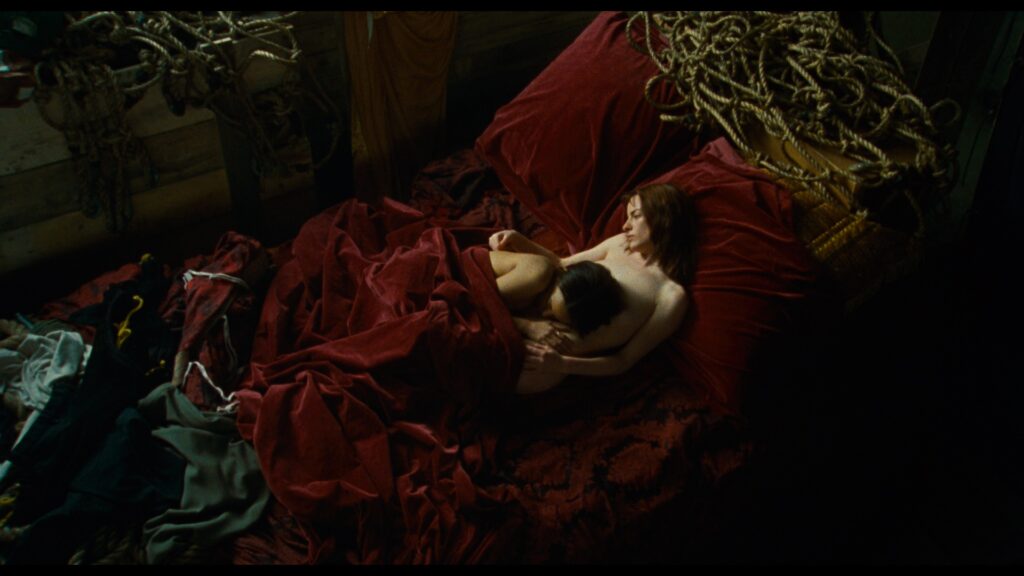
“I’m just led by my own wishes and my wish was for a really classical, beautiful, relish-the-sensuality” movie, she says. The film earned Rozema a permanent place in lesbians’ hearts because of this —and also because she had fashioned an interracial love story between an adorable, impulsive Black circus performer and a very white, repressed theologian. This had never been seen before and it seemed to embody the range of lesbian desire. Visually stunning, unpredictable, it combines several hallmarks of Rozema’s style: theatricality; discourse; duality; magic; music—all driving the characters towards their necessary breakthrough moments of transcendence.
When I remark upon the tropes that are already present in these first three films, she reveals that she writes many of the characters after aspects of herself. In Mouthpiece (2018) this is used to startling effect with two dissimilar and contrary actresses playing the one character—a daughter conflicted about her mother’s love, legitimacy, and legacy. Rozema has always worked to individualize certain aspects of her personality and put them in conflict with each other. “That is and was me. Whenever I speak I’m like ‘Yes, oh but…” and speak the opposite.” Thesis, antithesis, synthesis is a way of thinking explored in this movie, and it leads to what feels like an impossible resolution that when it arrives, is incredibly moving and cathartic to anyone who had a mother or any force larger than ourselves that got in our way of self-acceptance. Rozema is attuned to this theme “I think, because I was a queer little person in a completely condemning but spiritual environment,” she says.
The female protagonist dealing with a divided self reaches its apotheosis in Mouthpiece, but thematically can also be seen in Rozema’s Into the Forest (2015) where Evan Rachel Wood and Elliott Page (then billed as Ellen) play sisters who must act as one family unit during what appears to be a global apocalypse.
When Rozema was just starting out as a filmmaker she had a list of her top ten favorite directors. Not one was a woman. One recent study estimated that fewer than 1 in 6 confirmed 2024 movie releases were directed by women. It seems to have taken decades for a Greta Gerwig to arrive at the industry apex with female-centered themes—but it came with an 11-inch plastic doll as her Trojan horse. Instead of watching Barbie again and believing it’s groundbreaking cinema, go back and experience the films of Patricia Rozema and see how it was done—long before digital, before big budgets, and before queerness was accepted in mainstream storytelling, anywhere.
Follow Patricia Rozema online here and here.

Kino Lorber presents the retrospective and celebration of Patricia Rozema’s work on the big screen.
Newly 4K restored films directed by Patricia Rozema will screen at the Roxy Tribeca in New York City (April 5-11) and in Los Angeles at the Academy Film Museum and at the UCLA Film Archive (April 26-30). Select films will also screen at Laemmle Theaters in LA on May 7-8 and 13-14. Patricia Rozema will be present for Q&As at select Toronto, New York and Los Angeles screenings. This is the first large-scale tribute in the U.S. to this award-winning Canadian director.
About the films
4K restored – I’VE HEARD THE MERMAIDS SINGING (1987) – Winner of the Prix de la Jeunesse at the 1987 Cannes Film Festival – became a queer and indie cinema classic. The film opened the Toronto International Film Festival and went on to win numerous awards and was ranked in TIFF’s list of Top 10 Canadian Films of all time. A charming and whimsical story about a daydreamer with artistic aspirations, Patricia Rozema’s fanciful character study follows an amateur photographer Polly (Sheila McCarthy) as she lands a temp job at a Toronto art gallery run by elegant and sophisticated Gabrielle (Paule Baillargeon), who is also a painter. Polly is impressed with Gabrielle’s paintings, but as Polly gets to know Gabrielle’s lover, Mary (Ann-Marie MacDonald), and becomes entangled in their lives, she realizes that Gabrielle isn’t exactly who she appears to be. The absent-minded temp with spiky orange hair and the polished curator with a gift for gab are like night and day, yet a strong connection builds between these two women through their shared love of art, and their genuine curiosity and need for love.
4K restored – WHITE ROOM (1990) – never before released in the United States, Patricia Rozema’s second feature WHITE ROOM, is a harrowing fairy tale, as much about the consequences of naive romanticism as it in about our uniquely modern obsession with celebrity. In this “journey through genres”, WHITE ROOM centres on would-be writer Norman (Maurice Godin), a directionless soul who, afflicted with writer’s block, takes to wandering the suburban boulevards at night and peeping on his neighbours – especially one “Madeline X” (Margot Kidder) – a famous singer who is murdered one night as the horrified Norman watches, too stunned to intervene. Overcome with guilt, Norman attends her public memorial, where he meets an enigmatic woman (Kate Nelligan) with unexplained connections to Madelaine X. He follows her home to see her slip into a secret room every night. Set in the cultural landscape of bohemian Toronto at the dawn of the ’90s, WHITE ROOM explores the incompatibility of the fragile openness needed to create art and the impossibly thick skin required to sell it.
4K restored – WHEN NIGHT IS FALLING (1995) – the film had its world premiere in the Official Competition at the 1995 Berlin Festival, and went on to become an instant lesbian classic. Camille (Pascale Bussières) is a mythology lecturer at a conservative Christian college. She’s engaged to be married and is on the path to a stable career. But, when her dog dies, Camille finds her life unraveling. At a low ebb, she crosses paths with fiery circus performer Petra (Rachael Crawford), and sparks fly. With Petra pursuing her ardently, Camille experiences a sexual awakening and must confront the daunting prospect of changing her entire existence.
35mm – MANSFIELD PARK (1999) – Patricia Rozema’s daring adaptation of Mansfield Park is a witty look at romance and reality, Jane Austen style. Rozema has taken Jane Austen’s third and most controversial novel and infused its lead character with the irreverent and mischievous nature at the heart of Austen’s own letters and early writings. The result is an original social satire with a strong-willed heroine at its centre who, á la Austen, attempts to outsmart the dizzying labyrinth of marriage and social status — without compromising her ideals or her heart. This is the story of Fanny Price (Frances O’Connor), who emerges from this comedic maze having discovered the rightness of one true love.
DCP – Conceived as a project to make 19 of Samuel Beckett’s plays available on film, BECKET ON FILM (2000) featured a different cast and director — drawn from theater, film and other artistic fields — for each play. Happy Days is Patricia Rozema’s contribution to the canon, wherein she masterfully directs the plight of two characters stuck in the desert sand, which, like many of Beckett’s works, has them in a bad situation that by the second half gets much worse. Starring the captivating Rosaleen Linehan, this rarely screened TV movie is a delight of dialogue that purposefully uses the confines of the space, the situation, and the screen to bring the absurd to life.
4K restored – MOUTHPIECE (2018) – won the Directors Guild of Canada Outstanding Directorial Achievement in Feature Film Award and was voted a Canada Top Ten of in 2018. The film is a tender, innovative examination of the shattering experience of grief shot through with a darkly surreal streak of humor. Adapted from the multi-award winning play of the same name, MOUTHPIECE unfolds through raucous jokes, musical numbers and heartbreaking memories that add up to a deeply moving and political portrait of a mother and a daughter as seen through the eyes of one conflicted young woman.
New York Screenings / Q&As
7:15PM Friday April 5th / White Room
https://www.roxycinemanewyork.com/screenings/white-room-plus-qa-with-patricia-rozema/
5:15PM Saturday April 6th / Mansfield Park
https://www.roxycinemanewyork.com/screenings/mansfield-park-35mm/
7:30PM Saturday April 6th / When Night Is Falling
https://www.roxycinemanewyork.com/screenings/when-night-is-falling/
5:15PM Sunday April 7th / Mouthpiece
https://www.roxycinemanewyork.com/screenings/mouthpiece/
Los Angeles Screenings / Q&As
April 26-29: https://www.academymuseum.org/en/programs/series/weekend-with-patricia-rozema and https://cinema.ucla.edu/events/2024/patricia-rozema
Laemmle Theaters
May 7 & 8: When Night is Falling
May 13 & 14: Mouthpiece

